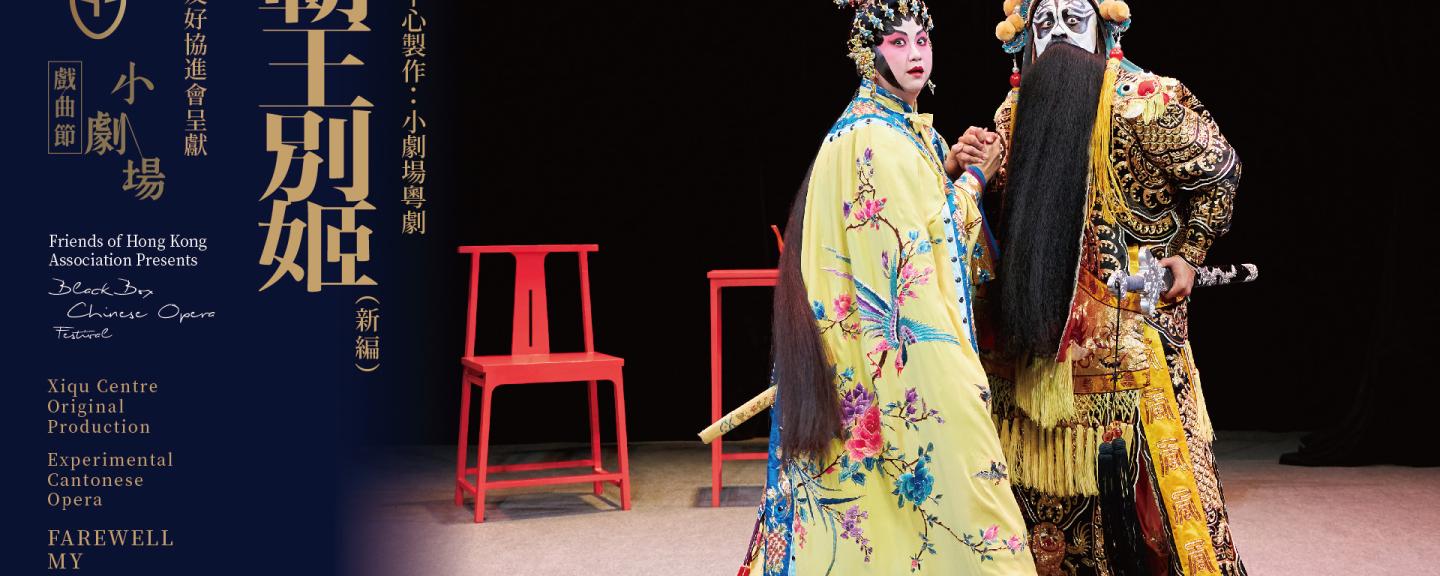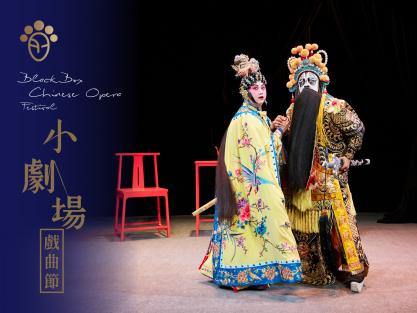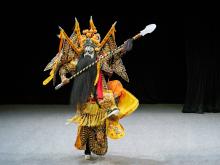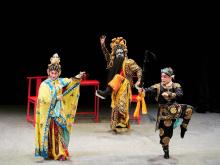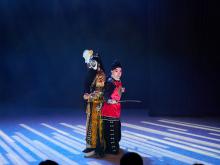Main
Description
Blending traditional Cantonese opera techniques with contemporary stage and lighting design, this ground-breaking adaptation reimagines the last moments of a hero caught between reality and illusion.
The Xiqu Centre’s first commissioned work has received rave reviews for performances in various cities in Asia.
Awards:
- “The 40 Most Influential Experimental Theatre in Contemporary China” by the 40th Anniversary of Experimental Theatre in China
- “Honorary Credential Award” by Xiqu Opera Black Box Festival (Beijing) 2018, 2019
- “2017 Best Experimental Xiqu” by China (Beijing) Performing Arts Expo 2018
A level of artistry rarely seen in Hong Kong. Excellent plot, acting and singing.
── Man Lai-fung, Hong Kong Cantonese opera performer
A quality production that dazzles your eyes, touches your heart and captures your imagination.
── Wu Tong, Deputy Director of the Chinese Theatre Literature Association (Beijing, China)
Title Sponsor:
Produced by:

Artistic and Production Team:
Producer: Naomi Chung*
Playwrights / Directors / Music Arrangers: Keith Lai, Janet Wong
Technical Director: Rae Wu*
Set Designer: Wong Yat-kwan
Lighting Designer: Leo Siu
Sound Designer: Wan San-hong
Costume Designer: Mandy Tam
Headgear Designer: Ken Tsang
Assistant Producer: Peter Lee*
Production Managers: Fanny Lo*, Katrina Chan*
Producer’s Assistants: Novia Chong*, Hazel Yau*
Cast:
Keith Lai as Xiang Yu
Janet Wong as Yuji (Concubine Yu)
Ng Lap-hei as Groom / Soldier
Musicians:
Ensemble Leader: Mao Yijun
Percussion Ensemble Leader: Chan Ting-pong
Musicians: (In alphabetical order): Chen Yifan, He Zhuotao, Ho Cheuk-chun, Lai Ka-wai, Leung Shuk-in, Ko Wing-hei, So Siu-fun, Wong Yuen-ling, Zhong Shi-ling
Production Team of 2016 premiere:
Lighting Designer: Allen Fung
Sound Designer: Yuen Cheuk-wa
Costume Designer: Mandy Tam
*Staff of West Kowloon Cultural District
Additional info
Tabs
The Xiqu Centre’s first commissioned work, Farewell My Concubine (New Adaptation) blends Cantonese opera traditions and bold innovations, blazing a new trial for a centuries-old art form as part of our mission to transcend traditional frameworks, explore new and original works and forge a new direction for Cantonese opera.
In this reimagining of the historic tragedy, told from the perspective of warlord Xiang Yu, we follow the hero’s downfall, from the siege and defeat of his troops, to his final farewell with his lover and subsequent suicide – each scene pushing him deeper into despair.
The work opens with the entry of Xiang Yu and a prelude demonstrating traditional Cantonese opera performance skills. The minimalist set, a contemporary take on the traditional “one table, two chairs” stage setup, is complemented by modern lighting design, with spotlights used to accentuate Xiang Yu’s isolation. Throughout the production, songs are sung in a combination of archaic Central Plains Mandarin (guanhua) and contemporary Cantonese, with tunes played by a traditional Cantonese opera luo gu (gongs and drums) ensemble. When Xiang Yu bids farewell to his consort, the performers adopt contemporary bangzi and erhuang singing styles while performing xiaoqu (folk tunes) in the archaic dialect. In the final scenes, the introduction of contemporary melodies accentuate Xiang Yu’s psychological turmoil.
Cantonese Opera
Originating in the Guangzhou region of southern China, Cantonese opera is a genre of Chinese traditional theatre that is popular in Guangdong, Guangxi, Hong Kong and Macau, as well as the Chinese diaspora in Southeast Asia, America and Europe. The singing style adopts elements of bangzi and erhuang (traditional vocal and phrasing styles), and combines tunes of various origins, including set tunes from gaoqiang (high-pitched) and Kunqu genres and elements of folk narrative singing. Cantonese opera was inscribed onto the UNESCO Representative List of the Intangible Cultural Heritage of Humanity in 2009.
